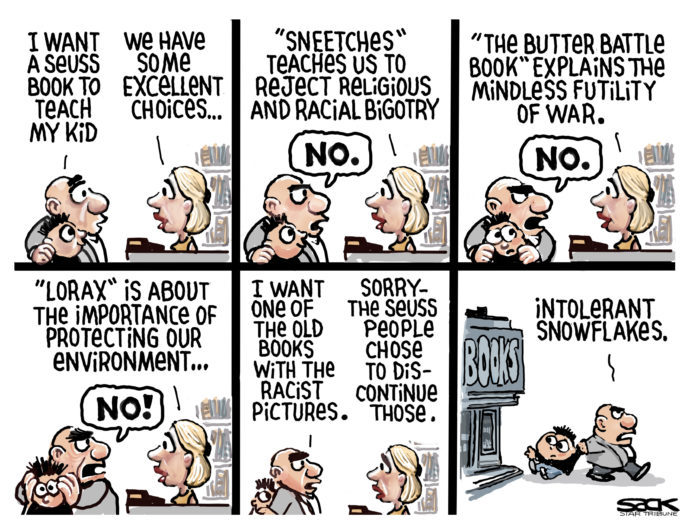About 40 years ago, after my first black-listing from the newspaper business, I did what all newspaper people do, I wrote a newspaper play. Buried Inside, referring to hiding stories that might embarrass the “good people” in a community, followed our young newspaper heroes as they came to grips with the limitations imposed upon them.
The reporters, men and women, relied upon each other for the support often lacking from management. They spent their mornings in witty, clever banter with each other, discussing the news and their own off-work exploits. Ben Hecht, beware!
A few years ago, I thought about revising the effort. To my horror, the supposed give-and-take dialog among the staff, designed to portray them as equals, was so base-line sexist as to prove embarrassing. No revision here. And no one who read it 40 years ago said anything about that now-inappropriate language.
Times change. With luck, people do, too. We can actually grow, learn.
A couple weeks ago, Dr. Seuss Enterprises, the company that controls the Dr. Seuss franchise, announced that it was stopping the sales of six books because they ”portray people in ways that are hurtful and wrong.”
The decision was made by the Dr. Seuss folks after a year of study. “Ceasing sales of these books is only part of our commitment and our broader plan to ensure Dr. Seuss Enterprises’ catalog represents and supports all communities and families,” they said.
In The Cat’s Squizzer, the Seuss group pointed out, “the Japanese character is referred to as ‘a Japanese,’ has a bright yellow face, and is standing on what appears to be Mt. Fuji.”
In If I Ran the Zoo, “The three [and only three] Asian characters who are not wearing conical [“coolee”] hats are carrying a White male on their heads … The text beneath the Asian characters describes them as ‘helpers who all wear their eyes at a slant’ from ‘countries no one can spell.'”
You would think that Dr. Seuss Enterprises has the right to maintain its own catalog. Not so, according to the dedicated racists among us, who cling to stereotypes so they don’t have to address the personhood of anyone looking different than they do.
And we must assume, too, that part of their outrage stems from their subsurface realization that some people have grown, have learned – and they have not.
Then, too, moving forward carries with it the tacit notion of imperfection. The resistance to removing statues of racist traitors who tried to destroy this country and maintain human slavery shows just how deep the resistance to change can be.
I mean, if people can’t admit that great-great-grandpa and -grandma were wrong, it might be too much to expect them to ever look in a mirror with any discernment.
We must presume they are hoarding and treasuring copies of Disney’s Song of the South – also removed from circulation by its owners.
Times change. Individuals can actually wise up. Cultures, too.
Two of the great screwball comedies of old Hollywood are It Happened One Night and The Philadelphia Story. Early in the first movie, the grown heroine’s father just hauls off and slugs Claudette Colbert for disagreeing with him. Early in the second one, Cary Grant grabs Katherine Hepburn one-handed by the face and pushes her to the ground.
I guess such violence was still funny in 1963 when, in McLintock, John Wayne and his son Patrick, in turn, spank Maureen O’Hara and Stefanie Powers, respectively, though certainly not respectfully. Talk about putting uppity women in their proper, subservient place!
I’m among the crowd that considers Casablanca the greatest film ever made. It is: a romance, on several levels; a war story; a buddy movie; a spy movie; a musical in that the songs advance the plot; a cop movie; a film noir since most of the action [properly shady] takes place in the dark, and it ends with a fast-draw gunfight.
You couldn’t ask for much more. What you could ask for is the excising of one word. When Ingrid Bergman’s Ilsa arrives at Rick’s and recognizes Sam, the piano player, she asks a waiter to send the “boy” playing the piano over to her table. Dooley Wilson, the “boy,” is 21 years older than Ingrid. But he is a Black man. “Did you say, ‘Roy?’”
Which brings us to Marlow’s favorite son, Republican state Rep. Brad Boles – former mayor, former school board member, once the largest employer in town.
Boles found himself apologizing last week for remarks during a heated discussion on yet another Oklahoma Lege attempt to monitor women’s bodies, make them second-class citizens.
As reported by Newsweek, “During the debate, Rep. Boles said: ‘In 2017, 862,000 babies were aborted. Twenty-eight percent of those babies were colored babies.’”
Well, this not being 1955, “colored” is considered an offensive term today. Times change; standards change with them.
Apprised of 21st Century norms, Boles responded, “Through the slip of the tongue, I said a word that was not what it was intended to be so I apologize for any of the members of the House or that listened online that I may have offended.”
Well, there’s a hint of discernment.
Oklahoma Democratic Party Chair Alicia Andrews – “a black woman who is old enough to be his mother” – expressed shock at Boles’ terminology and pointed out, “Colored is not part of your normal lexicon. If it’s not part of your normal lexicon, it doesn’t just come out. So, it is part of who he is.”
Yes, our slips of the tongue fall to what is on the tips of our tongues, not to obtuse, esoteric terminology to which we are not familiar.
Isn’t that right, Mark Rowan?
Gosh, just when we were not missing former Sen. Paul Scott’s crude remarks and rude behavior, another Republican legislator boldly steps forward to embarrass Stephens County.








